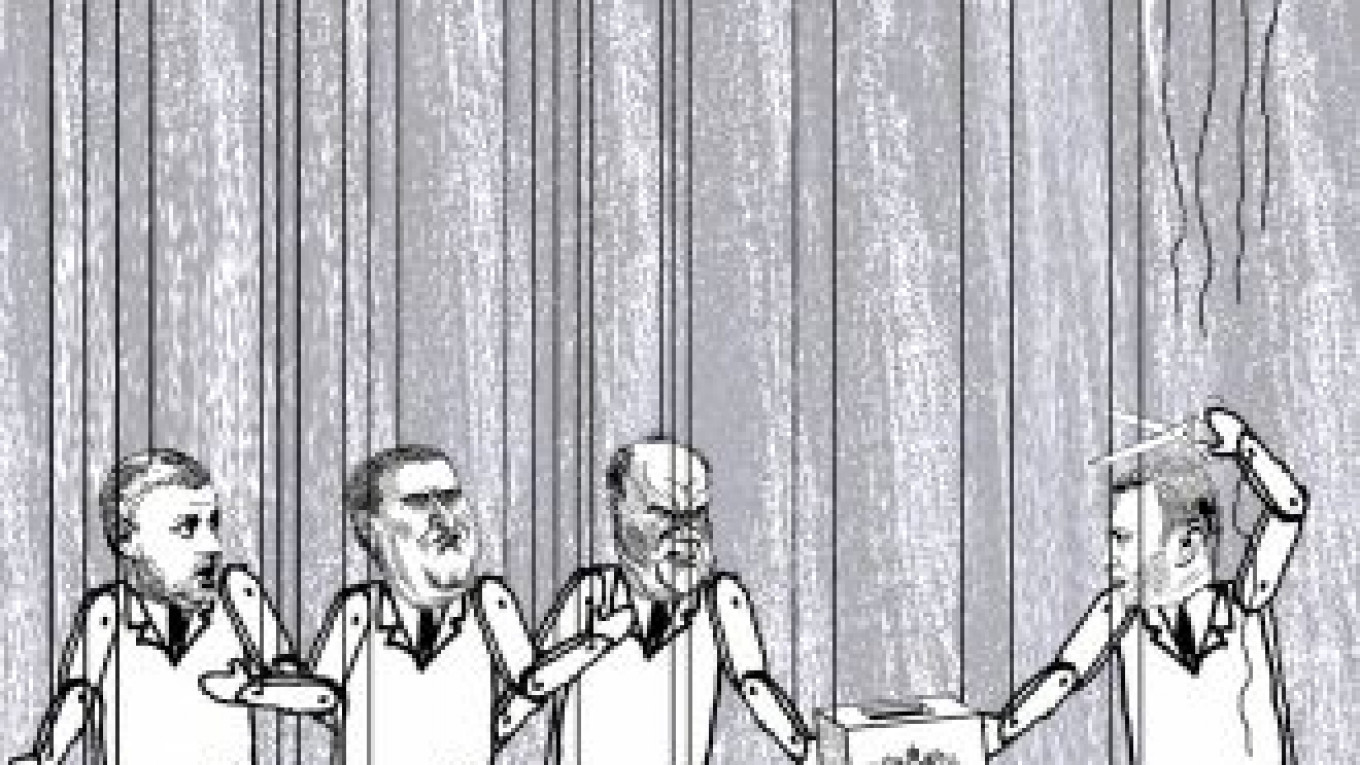The Moscow Elections Commission decided not to invalidate the candidacy of opposition leader Alexei Navalny in his bid for the mayoral post despite allegations that he had committed a number of electoral violations, including owning an undeclared firm in Montenegro, an allegation he denied. Shortly before that, police officers and Just Russia party activists forcibly entered and searched the apartment of Navalny supporters and reportedly found illegal campaign materials.
Until recently, the compliant elections commission would definitely have eliminated any "undesirable" candidate from that race, if it was deemed necessary. But it appears that Navalny is playing a key role in the election and therefore will not be removed from the election.
According to one theory, ultra-conservatives close to President Vladimir Putin are playing the "Navalny card" against acting Mayor Sergei Sobyanin to keep his popularity and political influence in check. This would prevent Sobyanin from later positioning himself as a possible successor to Putin. Remember that Putin won only 47 percent in Moscow in the 2012 presidential vote, and some members of the elite want Sobyanin to win in the first round with only a slim margin. Navalny's 15 percent or 20 percent of the vote can help with this task.
The second theory holds that Navalny has been allowed to run to give him a "public flogging." If he receives 10 percent — or even 20 percent — of the vote, the authorities can say, "Look how little support the so-called opposition leader and outspoken Putin critic enjoys even in his home territory of liberal Moscow." This scenario suggests that the authorities are orchestrating a subtle campaign that would indirectly give the advantage to Sobyanin. If the televised debates were held on large television stations during prime time, they would have given a boost to telegenic Navalny, particularly considering his oratory skills. This is precisely why the debates were shown on small, regional television stations and allotted a non-primetime slot. What's more, Sobyanin, who is no debater and who lacks the demeanor of a strong public politician, refused to participate in the debates.
Sobyanin's style also stands in direct contrast to Navalny's grassroots election campaign in which he has been meeting and speaking with voters at subway stations, shopping malls and apartment buildings, reaching beyond his core electorate of Internet users to gain support from retirees and other voters whose support largely determines the outcome of elections. And this tactic undermines the effectiveness of the authorities' plan to publicly discredit the opposition leader. Now, even if Navalny loses by a wide margin, he will have added support from new groups of voters to his electorate.
Navalny has transformed the Moscow mayoral race into more than just a referendum on the best ways to cope with the city's numerous problems. It has become a vote of confidence in the Kremlin and Putin.
The most interesting consequence of the current election campaign is the conclusive discrediting of the three "systemic opposition parties" — the Liberal Democratic Party, the Communist Party and Just Russia. Those parties might have played their designated role by attracting some of the protest vote in the last State Duma elections, but now they have clearly outlived their function. Throughout the past year, this pro-Kremlin "opposition" abandoned any semblance of independence by voting alongside United Russia in support of many high-profile and politically repressive bills. As undisguised marionettes of United Russia and the country's leadership in general, all three of these parties simply play act as a spoiler in elections now.
Just Russia has gone through the greatest evolution in this regard. Only a year ago, several party members, such as Dmitry Gudkov and Ilya Ponomaryov, were vocal critics of the Putin regime and even spoke out at the mass street protests. Just Russia held many grievances against the regime and was considered the main "systemic" opponent to United Russia. But today, Just Russia candidate Nikolai Levichev, who himself has a popularity rating not much above zero, stood alongside police when they broke into the campaign headquarters of Navalny activists.
Now that those "opposition" parties have been fully discredited, it is possible to predict that Russian politics will undergo another transformation, evolving toward a more effective two-party system in either the near future or by the next Duma elections at the latest.
Georgy Bovt is a political analyst.
A Message from The Moscow Times:
Dear readers,
We are facing unprecedented challenges. Russia's Prosecutor General's Office has designated The Moscow Times as an "undesirable" organization, criminalizing our work and putting our staff at risk of prosecution. This follows our earlier unjust labeling as a "foreign agent."
These actions are direct attempts to silence independent journalism in Russia. The authorities claim our work "discredits the decisions of the Russian leadership." We see things differently: we strive to provide accurate, unbiased reporting on Russia.
We, the journalists of The Moscow Times, refuse to be silenced. But to continue our work, we need your help.
Your support, no matter how small, makes a world of difference. If you can, please support us monthly starting from just $2. It's quick to set up, and every contribution makes a significant impact.
By supporting The Moscow Times, you're defending open, independent journalism in the face of repression. Thank you for standing with us.
Remind me later.


